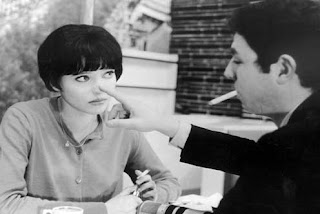A mighty "good showing" by The Archers ( Michael Powell and Emeric Pressburger) who created classics like "The Red Shoes", "The Life and Death of Colonel Blimp", "I Know Where I'm Going!" etc. "Black Narcissus" was probably one of the most dark but beautifully shot films ever made, it comes as a surprise to me since I have only seen few Archer films but I didn't know that they can produce a well made thriller in the tradition of Hitchcock.
The film starts in a convent where a group of nuns are sent high up in isolated region of Mopu in the Himalayas, they are lead by Sister Clodagh (Deborah Kerr) who's task is to educate and civilize the locals by building a hospital and school for the children. Clodagh is the "Sister Superior" assigned to lead the group, the nuns also consists of Phillippa (Flora Robson) the gardener, Briony (Judith Furse) who is knowledgable in medicine, the likeable Honey (Jenny Laird) and the mentally unstable Ruth (Kathleen Byron).
The Old General (Esmond Knight) amusingly gives them a palace to stay in which was formerly used by the concubines of the old ruler, they immediately struggle to find peace and harmony in their new sensual surroundings. The caretaker Angu Ayah (May Hallatt) makes fun of the nuns and the cynical but seductive Mr. Dean (David Farrar) adds to the unrest and escalating tension in the nunnery.
The Archers in this film are able to portray nuns as ordinary human beings rather than the uncorrupted saints that they are often shown which was quite unusual for it's time. The nuns are shown to make mistakes both minor and fatal like everyday people do, one of them even goes nuts with desire for Dean (the bare legs did it) even to going as far as to try to commit murder for the sake of lust and desire which is not often a normal person would do.
"It's Sabu!"
The cinematography is breathtaking as the camera shows the majestic palace sitting atop the heavenly mountains of the Himalayas, Kerr in her starring role was good enough in playing the conflicted nun but she was overshadowed by Kathleen Byron who played the psychotic Ruth to the bone. Ruth is shown in the beginning as fragile and delicate but her sexual desires are awakened by the rugged bare legged Dean who seemed to enjoy torturing Clodagh instead because of his desire for her which sends Ruth into a jealous fit.
Much worse is the arrival of The Young General (Sabu) who wears a perfume which earned him the nickname "Black Narcissus", he runs away in the middle of the film with Kanchi played by the young Jean Simmons in a none speaking role. Some critics may say that it is a highly erotic film but I never really felt it because I was too worried by the crazy nun and I really didn't find the nuns attractive enough even Deborah Kerr.
But I must say the film is very entertaining even though the story seemed very dated, The Archers were able to make use of the characters repressed feelings and turn it against them and each other. The cinematography is also top notch as the scenery and atmosphere contributes with the tension that continues to mount in each scene. The Archers shot another masterpiece definitely worth seeing. A real bullseye!
Rating: A






































